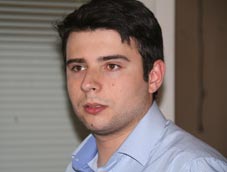The war in Tskhinvali as I saw it
By Temuri Kiguradze (continued from previous editions of The Messenger)
Monday, June 21

At the end of the conversation a young Ossetian took me by the hand and took me aside. “When you’re asked about who shot you, you should blame Georgians – understood?”
I returned to my bed and brought my Editor the good news that the Ossetians don’t really plan to shoot us. I lay down and dozed off. I woke up because a shadow fell before my eyes but did not know whether I was still asleep or not. In front of me stood a tall man with a Kalashnikov hand machine gun on his shoulder. We immediately recognised him; he looked at us with the same grin.
- Did you recognise me?
- Yes, we did.
- It was me who shot you and him.
- Yes I know.
- Where are your other two friends?
- They're dead, you know that.
- Yes, I know, I killed them. Translate for the American that I wounded him.
I translated; the American looked at him and said "Good shot".
The Ossetian laughed, and then said that he had taken Sasha’s car,
"It is mine now,” he said. I did not object.
Later I talked to the guy in the bed beside me. He appeared to be a friendly Tskhinvali resident of about 30 years old, his name was Igor. He had been shot in the leg, but the wound was trifling, and he said that in the morning he would join his unit again. Igor told me the news and rumours that had filled the town. I learned that Arabs fought in the Georgian Army as well as Africans and Chinese and besides that Ukraine had sent 200 girl snipers, all former sport shooting athletes, to South Ossetia.
- How do you know all that?
- The guys have told me…
One of the young doctors runs into our chamber with a shining face: "the Russians are already in Tskhinvali," he said. I learned that the units of the Russian 58th Army were already on the outskirts of the town. Realising that I do not really share his enthusiasm, the doctor quickly left. And that’s how August 9, the second day of our stay in the separatist region, ended.
The morning of August 10 brought some clarity to our situation; we met the de facto Minister of Healthcare of South Ossetia and he promised that the American and I would be evacuated to Vladikavkaz as soon as possible because the road through the Roki Pass is practically controlled by the Russian Army.
The evacuation began that afternoon, but there was not enough room for all the injured and we were left for the second wave. The hospital was almost empty: in our chamber there was only I, the American and one Ossetian militiaman wounded in the back, who looked angrily at us. No one knew whether the second wave of evacuations would take place. Have nothing to do I wandered around the half-destroyed hospital rooms, examining huge holes in the walls. My voyage was interrupted in the courtyard of the hospital, where I come under fire: shells were exploding so close that the earth was shaking under my feet. When I reached the bed, I decided to hold off walking for a while. Then the guy who lay in the corner called me, he had a tin in his hand.
- Hey, do you have a knife?
- No, do you want to eat? Have you got any food?
- Yes – some condensed milk.
- And nothing else?
- No.
I gathered the remnants of our meal, which we had got from the incoming women; there were some boiled potatoes, bread, cheese and chocolate. I don’t know why, but there was plenty of chocolate in Tskhinvali. After collecting the food on a napkin, I took it all to the soldier, who looked at me with an incredibly surprised face.
– Here you go, eat something. How old are you?
- Thank you, I'm 19. Are you really from Tbilisi?
- Yes, we are from there.
I turned and walked away, waiting for another stream of curses against Georgia and the Georgian Government, to which I have already got used these days. "Wait, wait, take the milk, have some," he said, handing me his jar.
The last wave of the evacuation came after a couple of hours. My American Editor got an injection of some powerful drug. His pain became so strong that the doctors were afraid that he could die of pain shock rather than gangrene. The ambulances took us to the north, through the smoking buildings of Tskhinvali and nearby Georgian villages. The road to Vladikavkaz was filled with Russian tanks and other armoured vehicles. I realised that the war was over, but I had no idea that after just a few hours these tanks would cross the administrative border and occupy my homeland.
Our ambulance stopped near the small Ossetian town of Java. “They are here”, I heard somebody saying outside the car. The back door opened and I saw the leader of the separatist territory Eduard Kokoity looking at us.
- So you are the American journalists? Have you filmed the blitzkrieg of the Georgian Army? Now go and cure yourselves.
I didn’t respond, my American Editor was unconscious. The doors closed and soon the vehicle continued on its way. I was sitting and trying to think where I had seen the same expression in the eyes that Kokoity had. And I remembered – I saw it in the eyes of the guy with the machine gun who shot us in our backs.
We have arrived in Vladikavkaz that night.
